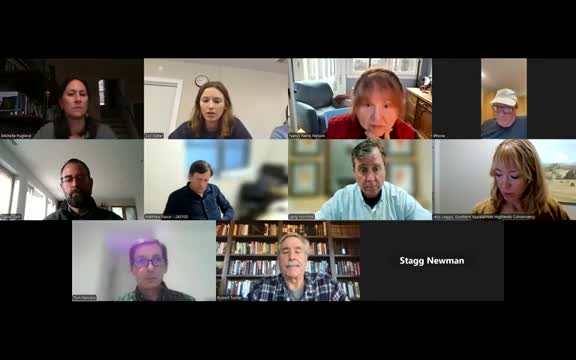Conserving Carolina seeks $504,000 in Buncombe bond funds for three Black Mountain Scenic Byway projects
Get AI-powered insights, summaries, and transcripts
Subscribe
Summary
Conserving Carolina presented three clustered projects along the Black Mountain Scenic Byway requesting a combined $504,000 from the county bond fund: Duck Branch (Brian & Barbara Cole) $176,000; Light Center nature preserve (United Research) $282,000; and a 13‑acre hayfield easement $46,000. Presenters said the asks are designed to secure or pair
Conserving Carolina asked the Buncombe County Land Conservation Advisory Board for a combined $504,000 in bond funding to advance three conservation projects clustered along the Black Mountain Scenic Byway in Broad River Township.
Tom, a Conserving Carolina representative, presented the requests on behalf of landowners and explained the funding strategy: county bond funds would leverage state and federal grants (North Carolina Land and Water Fund, ADFP, and USDA programs) and donated easement value from landowners.
The three projects are:
Duck Branch (Brian & Barbara Cole): a 62‑acre parcel with roughly 1,600 feet of frontage on the Black Mountain Scenic Byway and more than 780 feet of Duck Branch stream protection. Conserving Carolina requested $176,000 (approx. $155,000 for easement acquisition plus $21,000 transaction costs). The presenters said the Coles plan to donate an estimated $128,500 of easement value and that a Natural Heritage designation and site surveys (including ginseng and broadleaf coreopsis occurrences) will strengthen a refiled North Carolina Land and Water Fund application.
Light Center Nature Preserve (United Research, Inc.): a 112‑acre parcel with about 2,700 feet of Rocky Broad River frontage and a newly added 25‑foot visual buffer that would preserve 6,000 feet of continuous viewshed along Highway 9. Conserving Carolina asked for $282,000 of bond support to leverage an in‑hand Land and Water Fund grant (approx. $461,800). Presenters noted public access already exists via trails and that the landowner donated an initial 2‑acre easement in 2024. Presenters also noted cultural resources on the site, including the remains of a historic mill listed with the State Historic Preservation Office.
Hayfield at Light Center (United Research): a 13‑acre agricultural parcel in hay with high‑quality soils (about 98% prime soils) that adjoins the donated 2‑acre parcel. USDA NRCS and NC Land and Water Fund awards were described as tentatively secured for this site; Conserving Carolina requested $46,000 from the bond fund to complete the easement purchase.
Tom told the board the group is confident of state match success for several projects but asked the board to treat the requests as time‑sensitive: state scoring for Land and Water Fund favors applicants that can document secured matching resources. Presenters told the board that if state funding does not materialize Conserving Carolina would return funds to the county or renegotiate purchase terms; staff said the county would similarly recover unspent bond funds.
Board members asked technical questions about trail condition after Hurricane Helene, whether projects were in the city or county, and which funds cover purchase price versus transaction costs. Conserving Carolina said some photography and trail footage are post‑Helene and that trails are generally passable; they offered a YouTube link and said a site visit will be scheduled prior to the next board meeting.
No formal vote was taken on these funding requests at this meeting; presenters were asked to return with clarifications on precise bond accounting and to include site visit details.
